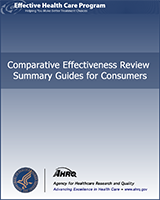NCBI Bookshelf. A service of the National Library of Medicine, National Institutes of Health.
Comparative Effectiveness Review Summary Guides for Consumers [Internet]. Rockville (MD): Agency for Healthcare Research and Quality (US); 2005-.
This publication is provided for historical reference only and the information may be out of date.

Do you have GERD?
The esophagus is the tube that carries food from the throat to the stomach. The stomach makes acid to digest the food. Sometimes the acid can back up into the esophagus. This can cause symptoms such as heartburn or even a sour taste in your mouth. When it happens often and over a long period of time, it is called GERD.
Many people have heartburn once in awhile. Others have GERD that is not too bad. They can keep it under control by lifestyle changes. Antacids or other over-the-counter medicines can also help.
This information is for people who have more severe GERD and are being treated by a doctor or other health care provider. Take this information with you when you and your provider decide how to treat your GERD.
What kinds of medicines can I take for GERD?
Most medicines to treat GERD work to lower the acid level in the stomach. The two main types of prescription medicines are:
- H2 receptor antagonists, or H2RAs. Examples are Axid, Pepcid, Tagamet, and Zantac.
- Proton pump inhibitors, or PPIs. Examples are AcipHex, Nexium, Prevacid, Prilosec OTC, and Protonix. Generic omeprazole is also available.
The PPIs work better than the H2RA medicines in treating GERD. But PPIs are more likely to cause side effects such as headache or diarrhea.
Studies show that, overall, each PPI works about as well as another for relieving symptoms.
Can surgery help?
Surgery can be performed to treat GERD. In the surgery, the top part of the stomach is wrapped around the lower part of the esophagus. This helps to keep acid from washing up from the stomach.
The common side effects of surgery are difficulty swallowing and bloating. Rare but more serious problems can occur.
Prescription medicines alone work about as well as surgery for relieving symptoms. Some people who have surgery still need to take medicine.
What about the new endoscopic procedures?
An endoscope is a tube that goes through the mouth into the esophagus. Using this scope, doctors can treat the lower part of the esophagus to improve how it works. These nonsurgical procedures are somewhat new. There is not enough scientific evidence yet to talk about how well they work.
For more information
These findings come from a report that compares treatments for GERD. You can find the report at www.effectivehealthcare.ahrq.gov.
You can find more information on GERD at www.healthfinder.gov. It will give you links to Web sites about health from many government and nonprofit groups.
- Review Association of Gastroesophageal Reflux Disease With Dental Erosion.[Cureus. 2022]Review Association of Gastroesophageal Reflux Disease With Dental Erosion.Chakraborty A, Anjankar AP. Cureus. 2022 Oct; 14(10):e30381. Epub 2022 Oct 17.
- Review Treatment of gastroesophageal reflux disease.[Pharm World Sci. 2005]Review Treatment of gastroesophageal reflux disease.Pettit M. Pharm World Sci. 2005 Dec; 27(6):432-5.
- [Evaluation of the impact of symptomatic gastroesophageal reflux disease on the result of surgical treatment with the use of endoscopic techniques and postoperative pharmacological treatment in patients with chronic sinusitis].[Przegl Lek. 2013][Evaluation of the impact of symptomatic gastroesophageal reflux disease on the result of surgical treatment with the use of endoscopic techniques and postoperative pharmacological treatment in patients with chronic sinusitis].Nieckarz R, Szaleniec J, Hartwich P, Wróbel A, Hydzik-Sobocińska K, Muszyński P, Markiewicz B, Turczynowski Ł, Składzień J, Strek P. Przegl Lek. 2013; 70(7):421-6.
- Review Canadian Consensus Conference on the management of gastroesophageal reflux disease in adults - update 2004.[Can J Gastroenterol. 2005]Review Canadian Consensus Conference on the management of gastroesophageal reflux disease in adults - update 2004.Armstrong D, Marshall JK, Chiba N, Enns R, Fallone CA, Fass R, Hollingworth R, Hunt RH, Kahrilas PJ, Mayrand S, et al. Can J Gastroenterol. 2005 Jan; 19(1):15-35.
- Review [Therapy of gastroesophageal reflux disease (GERD)].[Med Monatsschr Pharm. 2011]Review [Therapy of gastroesophageal reflux disease (GERD)].Storr M. Med Monatsschr Pharm. 2011 Dec; 34(12):446-54; quiz 455-6.
- Gastroesophageal Reflux Disease (GERD) - Comparative Effectiveness Review Summar...Gastroesophageal Reflux Disease (GERD) - Comparative Effectiveness Review Summary Guides for Consumers
- Streptococcus agalactiae GB00206 ctg7180000004596, whole genome shotgun sequenceStreptococcus agalactiae GB00206 ctg7180000004596, whole genome shotgun sequencegi|452729330|ref|NZ_ALTB01000013.1| WGS:NZ_ALTB01|ctg7180000004596Nucleotide
- Homo sapiens cDNA: FLJ21179 fis, clone CAS11174Homo sapiens cDNA: FLJ21179 fis, clone CAS11174gi|10437237|dbj|AK024832.1|Nucleotide
- Caenorhabditis elegans B-box type zinc finger protein ncl-1 (ncl-1), mRNACaenorhabditis elegans B-box type zinc finger protein ncl-1 (ncl-1), mRNAgi|1972265114|ref|NM_001392143.1|Nucleotide
- LOW QUALITY PROTEIN: moesin/ezrin/radixin homolog 1-like [Trichoplusia ni]LOW QUALITY PROTEIN: moesin/ezrin/radixin homolog 1-like [Trichoplusia ni]gi|1496238445|ref|XP_026745526.1|Protein
Your browsing activity is empty.
Activity recording is turned off.
See more...